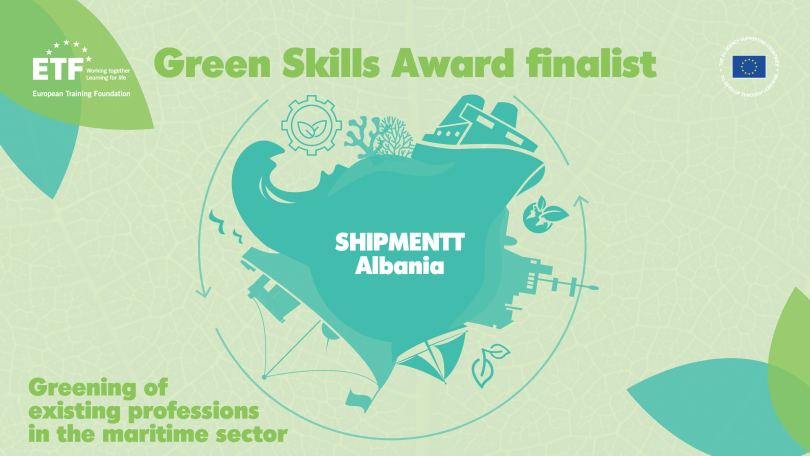
Albania's Green Skills Award finalist: SHIPmEnTT
Dr Mirela Koci and her group of international experts are on a mission to do their bit to tackle climate change.
As head of the Vlore, Albania-based SHIPmEnTT consortium of 10 organisations from eight countries in the Adriatic-Ionian, she is determined to help reduce CO2 emissions from commercial and tourist shipping in the busy sea lanes between Italy and the Balkans.
SHIPmEnTT - which stands for "StrengtHening Intellectual Property and technology transfer processes in GreEn sea MobiliTy sectors" - is one of eleven finalists in the European Training Foundation's Green Skills Awards.
Winners of the awards - designed to share good practice in the transition to a greener European area - will be announced June 25 as part of a four-day online event "Building lifelong learning systems: skills for green and inclusive societies in the digital era (21-25 June), jointly organised with UNESCO in collaboration with the EBRD, ILO and UNICEF.
Dr Koci, who is also executive director of Albania's Auleda local economic development agency, and a university lecturer who holds a PhD in mechanical engineering with a specialism in advanced composite materials for use in yacht construction, is passionate about the role that intellectual property and technology transfer can play in greening shipping around the world.
The consortium (members listed below) is funded from the INTERREG ADRION Programme 2014-2020 of the European Commission. With environmental projects that tackle climate change high on the agenda under the EU's European Green Deal, Dr Koci is already preparing an application for a more advanced project to build on what her consortium has already created.
"In 2018 maritime activities worldwide were responsible for releasing 797 million tonnes of CO2, according to the UN's International Maritime Agency. That figure is forecast to increase by 250% by 2050," she says.
"Emissions in our Adriatic-Ionian Strait of Otranto, between Italy and Albania, taking into account all emissions within 150 metres of the coast, on land, in ports and cities and shipping lanes, was 1.2 megatonnes [1.2 million tonnes] in the same year."
Digging deeper into the figures, the consortium found that 94% of emissions derived from coastal economic activites, 5% from shipping and 1% from maritime transport, although classified emission information for military shipping in the Italian port of Brindisi affects the precisio of those figures.
In her local coastal area she, where emissions are 55 tonnes annually, she aims to halve those figures by 2024 - like other members of the consortium working with the public sector, businesses and education and training providers are key tools to achieve this.
"We have an energy index which is designed to optimise energy use from ship engines and minimise fuel consumption and CO2 emissions. Working with engineering students to influence future design is crucial," Dr Koci observes.
"We are also providing simulations for the construction of small vessels, snowing how the use of light composite materials is both cost and energy proficient over time when compared with metal, which requires more frequent maintenance."
For companies that resist the up-front costs of construction from more expensive composites, Auleda has access to a guarantee fund, backed by an Albanian private bank, that can guarantee between 30-60% of funding for up to 10 SMEs and small start-ups each year in its four priority areas - tourism, other industry, innovation and education, and the maritime sector.
As coordinator for the consortium - which involves countries that includes Italy, Croatia, Greece, Montenegro, Serbia, Slovenia and Bosnia and Herzogovina in addition to Albania - Dr Koci believes that Albania has much to offer and gain from promoting green shipping.
"Albania has a new law on maritime technology, but we have few patents registered, even though we have a lot of innovation in the field of production of maritime vessels; there is a lack of culture to register brands or research or patent innovations. We are also keen to strengthen transfer of technology and to benefit from the lessons of other countries."
By involving key stakeholders, including policymakers and the SMEs and start-ups that are the heart of most maritime activity, and influencing education and training, SHIPmEnTT believes it can be part of the positive change the planet's climate crisis desperately needs.
SHIPmEnTT consortium members are:
- Foundation for Research and Technology (Praxi) Crete, Greece
- Area Science Park - Trieste, Italy
- ART -ER S.cons.p.a - Intellectual Property Department, Bologna, Italy
- Chamber of Commerce Rovigo - Venice, Italy,
- Chamber of Commerce, Republika SRPSKA, Bosnia & Herzegovina
- AULEDA - Local Economic Development Agency, Vlore County, Albania
- Public Institution Development Agency Sibenik - Knin County, Croatia
- Technocenter at University of Maribor, Slovenia
- Chamber of Commerce, Montenegro
- Zlatibor regional development Agency, Serbia
Did you like this article? If you would like to be notified when new content like this is published, subscribe to receive our email alerts.